|
|
|
Sort Order |
|
|
|
Items / Page
|
|
|
|
|
|
|
| Srl | Item |
| 1 |
ID:
172236
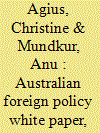

|
|
|
|
|
| Summary/Abstract |
After a 14-year gap, Australia’s 2017 Foreign Policy White Paper advanced a ‘comprehensive framework to advance Australia’s security and prosperity in a contested and competitive world’ (Australian Government 2017a, “2017 Foreign Policy White Paper.” https://www.fpwhitepaper.gov.au/., v). Focused on regional stability, partnerships and global cooperation, it identifies ‘risks and opportunities’ in an altered external environment. In this article, we argue that the neglect of gender and conflict prevention in the White Paper has implications for its stated aspirations with regard to peace and security. This is striking considering the attention that gender—particularly in the context of the Women, Peace and Security (WPS) agenda—has received in other policy areas and documents. Building on feminist security scholarship, conflict prevention approaches, and bringing in civil society voices, we argue that the White Paper contains a gendered, masculinist logic, separating domestic and international issues and paying insufficient attention to the structural and systemic causes of conflict. This article pursues a gender analysis in order to illuminate the gaps present in the White Paper and its limited vision of security and makes the case that conflict prevention from a gender perspective is key to sustainable peace, security and national interests.
|
|
|
|
|
|
|
|
|
|
|
|
|
|
|
|
| 2 |
ID:
151182
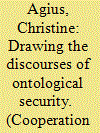

|
|
|
|
|
| Summary/Abstract |
The controversy of the Danish cartoon crisis in 2006 overshadowed a similar one that took place in Sweden a year later. The crises have broadly been framed as a clash of values but both cases reveal differences worthy of investigation, namely for the complex tensions and convergences between the two states on questions of immigration, Nordic solidarity and national identity. This article aims to explore the intersubjective discourses of identity that were threaded through the debates on the cartoon crises, looking to the overlapping discourses that have constructed ideas of identity in terms of ontological security, or security of the self. It argues that both cartoon crises represent a complex discursive performance of identity that speaks to a broader set of ontological security concerns which intersect at the international, regional and national levels. Even in their differences, Swedish and Danish discourses show the tensions associated with the desire for a stable and consistent idea of self when contrasted with the Muslim ‘other’, explored in the context of discourses of modernity and tolerance, which operate as key sites that work to reiterate, reclaim and reinstate the idea of the progressive state.
|
|
|
|
|
|
|
|
|
|
|
|
|
|
|
|
| 3 |
ID:
107614
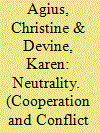

|
|
|
|
|
| Publication |
2011.
|
| Summary/Abstract |
This article approaches 'neutrality' as an essentially contested concept and traces its meaning and purpose over centuries-long historical timelines and situated political, societal and security contexts. It distinguishes neutrality from other concepts such as 'neutralization' 'non-belligerency', 'non-alignment', 'military non-alignment', 'military neutrality' and 'non-allied'. The article explains the politics of defining neutrality in the current European political and legal landscape and in the context of shifting definitions and practices of war, peace, security and state sovereignty. This episteme-based analysis focuses on changes to neutrality in accordance with the rise and fall of particular empires and international actors over time, and changes to its status linked to the development and reification of particular meta-theoretically-based subfields of International Relations and Political Science, setting the background to this special issue of Cooperation and Conflict. A renewed emphasis on the normative aspects of neutrality (i.e. the role of domestic values, politics, preferences, history and mass publics in foreign policy formulation) is achieved by employing a range of perspectives, characterized by increased pluralism in levels of analysis and theoretical approaches. Through this pluralism, authors engage with (1) the strategic and normative drivers underpinning the norm of neutrality, (2) the potential for neutrals to serve as norm entrepreneurs in the field of peace promotion, (3) the tenuous legal status of elites' quasi-neutral foreign policy constructions underpinned by tensions between discourses and practices and (4) the discursive strategies underpinning the move from neutral states' traditional forms of neutrality to what is termed 'post-neutrality' in the current politico-legal context.
|
|
|
|
|
|
|
|
|
|
|
|
|
|
|
|
| 4 |
ID:
121824
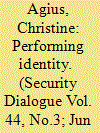

|
|
|
|
|
| Publication |
2013.
|
| Summary/Abstract |
The Danish cartoon crisis, which attracted international media attention in 2006, has largely been debated as an issue of freedom of speech, feeding into broader debates about the 'clash of civilizations'. This article aims to explore the dominant discourses that performed a seemingly stable and consistent Danish identity at the domestic and external levels. Domestically, the discourse of a progressive Danish identity under threat from unmodern others was performed via discourses of a 'culture struggle' and a restrictive immigration policy designed to keep intact a narrow definition of Danishness. Externally, Danish identity and security was performed and defended via participation in the 'war on terror', democracy promotion and overseas development assistance, which became tools that were not simply associated with security in the liberal sense but also contained a spatial dimension designed to keep consistent the image of the complete nation-state. By adopting a discursive approach, the article aims to explore the performance of Danish identity that animated the cartoon crisis in order to highlight the complexities and contestations that animate ideas of self.
|
|
|
|
|
|
|
|
|
|
|
|
|
|
|
|
| 5 |
ID:
107618
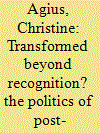

|
|
|
|
|
| Publication |
2011.
|
| Summary/Abstract |
The transition from neutrality to post-neutrality has been debated by constructivists and rationalists alike as a seemingly logical and unproblematic move: the end of the Cold War and the widening of the security agenda in a globalizing world have meant that a state-centric approach to security is no longer viable or desirable. The former neutrals are subsequently reconfiguring their security policies to reflect this development and contributing to European and NATO security initiatives, and at the same time contributing their own unique 'soft security' experiences and practices. This article aims to problematize this seemingly smooth move from neutrality to post-neutrality by examining the discourses deployed to facilitate this change. Arguing that there is a politics of post-neutrality at work, it draws attention to how identity is being reconstituted in the process of European integration and identity-formation, and how discourses on changing forms of security cooperation are facilitating the discursive dissemination of an inevitable logic that neutrality in any form will eventually be abandoned.
|
|
|
|
|
|
|
|
|
|
|
|
|
|
|
|
|
|
|
|
|